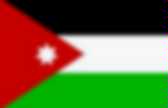

Jordan: Democracy Delayed by Nicolas Pelham. In a region where politics is not only governance but popular theater, Jordan’s first parliamentary election since the eruption of the Arab Spring two years ago provided a brief moment of comic relief.
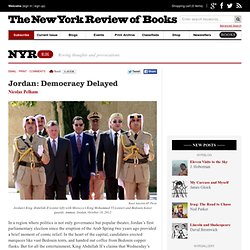
In the heart of the capital, candidates erected marquees like vast Bedouin tents, and handed out coffee from Bedouin copper flasks. But for all the entertainment, King Abdullah II’s claims that Wednesday’s election would mark Jordan’s transition to democracy seemed hyperbolic. In fact, the election was boycotted by five opposition parties, including the oldest and most powerful, the Muslim Brotherhood, as well as a raft of former prime ministers, and even according to disputed official figures less than 40 percent of the kingdom’s voters bothered to register and vote.
Jordan’s election: Bad for the king. Identity and the Jordanian Elections - By Laurie A. Brand and Fayez Hammad. The period of Arab uprisings that began in winter 2010 to 2011 has brought myriad changes to the region.

If change comes to Jordan, it won't start in Amman. But Dahabi is one man, and the perceived problem is widespread.
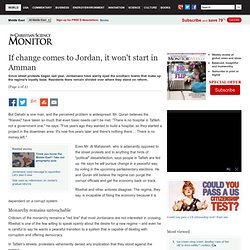
Mr. Quran believes the "thieves" have taken so much that even basic needs can't be met. "There is no hospital in Tafileh, not a government one," he says. "Five years ago they wanted to build a hospital, so they started a project in the downtown area. Jordan Protests: Shock Absorbed, the Regime Will Not Fall. Middle East Research and Information Project. The November 13 withdrawal of fuel and electricity subsidies has sparked vigorous demonstrations in Jordan, prompting renewed speculation about whether the wave of Arab uprisings that began in late 2010 has finally arrived in the Hashemite Kingdom.
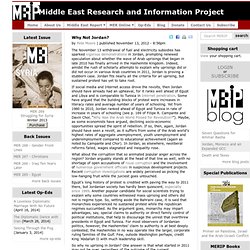
Indeed, amidst the rush of scholarly attempts to explain why uprisings did or did not occur in various Arab countries in 2011, Jordan is proving a stubborn case. Jordan fits nearly all the criteria for an uprising, but sustained protest has yet to take root. If social media and Internet access drove the revolts, then Jordan should have already had an upheaval, for it ranks well ahead of Egypt and Libya and is comparable to Tunisia in Internet penetration. Jordan is not about to collapse. By Nicholas Seeley * Foreign Policy If one is to believe what's in the papers, it's a bad year for Jordan.
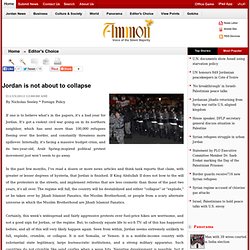
It's got a violent civil war going on in its northern neighbor, which has sent more than 100,000 refugees fleeing over the border, and constantly threatens more spillover. Internally, it's facing a massive budget crisis, and its two-year-old, Arab Spring-inspired political protest movement just won't seem to go away. The European Council on Foreign Relations. Go to the Middle East and North Africa programme's page.

Will Jordan Be the Next To Fall? The Possibility Is Bad News for Israel and the U.S. On Wednesday, U.S.
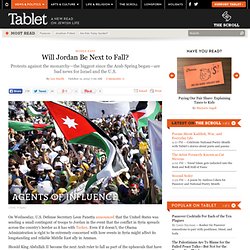
Defense Secretary Leon Panetta announced that the United States was sending a small contingent of troops to Jordan in the event that the conflict in Syria spreads across the country’s border as it has with Turkey. Even if it doesn’t, the Obama Administration is right to be extremely concerned with how events in Syria might affect its longstanding and reliable Middle East ally in Amman. Should King Abdullah II become the next Arab ruler to fall as part of the upheavals that have swept through the region now for almost two years, it will mark another major setback for the United States in the region.
For Israel it’s significantly worse news. Jerusalem would lose its remaining strategic partner in the region—having already lost Turkey and Egypt—and face a possible nightmare on its longest border, exposing the country’s center to attacks from the east that might include Sunni Jihadists or Iranian-trained Iraqi agents. Change and Continuity Leading into Jordan’s New Elections - By Curtis R. Ryan. King Abdullah of Jordan just appointed his fifth prime minister since the start of the 2011 regional Arab Spring, and a sixth will soon be on the way.

Veteran politician Abdullah an-Nsour was appointed to replace outgoing Prime Minister Fayez Tarawneh, who served for five months in the wake of the surprise resignation of pro-reform Prime Minister Awn Khasawneh (who had served for sixth months). New Prime Minister Nsour is charged with a transitional role by overseeing upcoming parliamentary elections, after which another new prime minister will emerge. Jordan's next elections will most likely be held in December 2012 or January 2013. Jordanian prime ministers don't tend to stay in office for lengthy terms, but even by Jordanian standards, the pace of government change these past two years has been rapid. For some Jordanians, this amounts to a fairly weak and all-too-familiar tactic for the monarchy to create the semblance of change, without actually having any. Curtis R. Jordan and its king: As beleaguered as ever.
Jordan Starts to Shake by Nicolas Pelham. Jordan's Balancing Act. Disquiet on the Jordanian Front. Is Jordan about to experience its first big moment of the Arab spring? Amman, Jordan's capital, has been largely spared the drama of events elsewhere in the Arab world over the past two years.

Demonstrations in March 2011 were contained and protests since have been restricted to outlying areas - albeit in loyal East Bank heartlands such as Tafila and Ma'an. Talk of reform has been accompanied by three changes of prime minister. Vers un printemps jordanien ?, par Hana Jaber. A Amman aussi, la parole se libère.
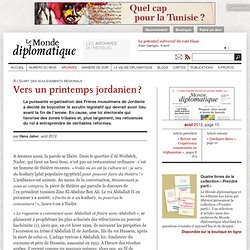
Dans le quartier d’Al-Weibdeh, Nader, qui tient un boui-boui, n’est pas un restaurateur ordinaire : c’est un homme de théâtre reconnu. « Voilà où en est la culture ici : je sers du koshary [plat populaire égyptien] pour pouvoir faire du théâtre ! » L’ambiance est animée. Au menu de la conversation, Maintenant je vous ai compris, la pièce de théâtre qui parodie le discours de l’ex-président tunisien Zine El-Abidine Ben Ali.
Le roi Abdallah II en personne y a assisté. « Invite-le à un koshary, tu pourras le convaincre ! », lance-t-on à Nader. « Le royaume a commencé avec Abdallah et finira avec Abdallah », se plaisaient à prophétiser les plus acharnés des réfractaires au pouvoir hachémite (1), alors que, en cet hiver 1999, ils suivaient les péripéties de l’accession au trône d’Abdallah II de Jordanie, fils du roi Hussein, après la mort de celui-ci. Jordan Going Darker. The Middle East Channel Editor's Reader #8 King Abdullah's approval this week of a controversial new law imposing potentially draconian controls over Jordan's internet is finally drawing attention to the country's increasingly dangerous political situation.
Jordan, Forever on the Brink. The sudden, unprecedented resignation by Jordan's Prime Minister Awn Khasawnah last week threw a sudden spotlight on the ongoing shortcomings of political reform in the Hashemite Kingdom of Jordan. The deficient new election law rolled out last month, like every step the King has taken over the last year and a half, did too little, too late to respond to the concerns of Jordanian citizens. Limited reforms have done little to stem a rising tide of protest across the towns of the south, a deeply struggling economy, loud complaints of corruption, and an intensifying edge of political anger.